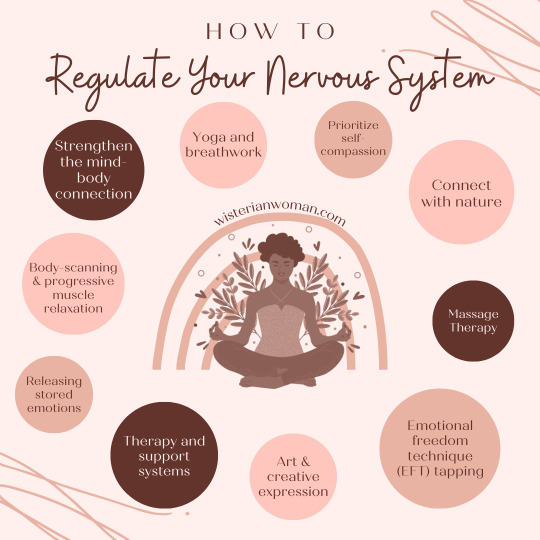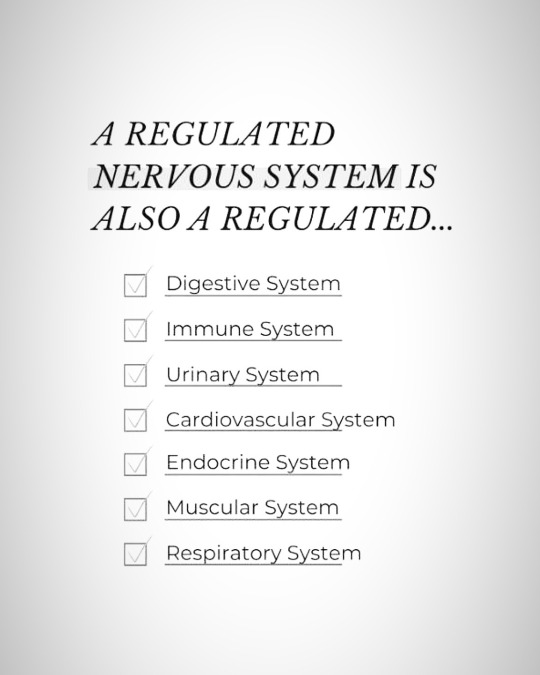#. Stress Reduction
Explore tagged Tumblr posts
Text
Please be gentle with yourself this next week 💕 Make sure you have clean sheets, your favorite comfort foods, take a few walks out in nature, and maybe have some little treats on hand.
45 notes
·
View notes
Text
How to tell when your cup is empty:
in the next few days, we'll be going through a series on filling your own cup in fulfilling and healthy ways, starting with journaling ideas and finally picking our own activities. but first -- how do we know when our cup is empty? it's a little different for every individual, but there's often a few things you can familiarize yourself with to understand in your own physical and emotional space.
-- what is your 'cup?' your cup is your emotional, energetic, and often physical energy. think of waking up well rested and energized for a new day! now compare that feeling to the sensation of coming home after work after a long day, complexly drained and exhausted. this is the feeling of an empty cup. you might also feel....
~ fatigue. this is the most common symptom! often when your cup is empty, you're drained by emotional and energetic events. you have very little energy to give to yourself and others, which is why self-care becomes much more difficult when we're working on empty (often this translates to the physical as well -- we crave sweet and salty things to help boost our adrenal glands and combat fatigue.) this also leads to irritability, because our energy is so drained we revert to internal and external negativity.
~ a felt weight. when my cup is empty or dangerously close, I can feel a heavy sensation centering in my chest; almost this huge emptiness. it's good to create mindfulness around these sensations, because it helps heighten awareness of warning signs.
~ worry and anxiety. you might feel as though you're being helplessly pulled in different directions, without the time or energy to finish anything. you're trying to pour from a cup you haven't replenished!
questions to ask yourself:
~ when do I often feel empty?
~ what activities drain my cup?
~ do any of my own habits help drain my cup?
~ how do I give my energy away and fill other people's cups?
~ how do I feel afterwards?
~ what's my usual habit when my cup is running low? how do I instinctually try to fix it?
~ do those habits serve me well?
in the upcoming weeks, we'll be discussing ways to fill our cups and tweak our individual habits to serve us better :)) have a lovely day, and tune in soon!
drop any questions in the askbox :))
#mental health#mental wellness#self care#self improvement#self love#mental wellbeing#self help#depression advice#depression and anxiety#positivity#filling your cup#anxiety coping#anxiety advice#depression coping#stress#stress reduction#stress and anxiety#coping with stress#coping with anxiety#self knowledge#self worth#self healing#sunrise thoughts: filling your cup
158 notes
·
View notes
Text
Avoiding caffeine on an empty stomach is also ideal for hormone balance, for those with a compromised gut, and for those with anxiety.
#caffeine#caffeine addiction#cortisol#anxiety#anxiety relief#stress#stress less#stress reduction#stress reliever#stress management#coffee#hormone balance#hormone imbalance#guthealth#gut#gut health#brain health#hormone health
20 notes
·
View notes
Text

“swinging” (c) Bernd Walz
* * * *
Descending Modulation: Why Massage Therapy Can Alleviate Pain Posted by Mark Olson | Oct 24, 2019 | Massage, Massage Science [Thanks Barbara Sharp Lmt]
“Clients walk out of a massage session feeling better, not because circulation was altered in the tissue or because of any direct mechanical manipulation of soft tissues, but because of the symphony of nociceptive modulatory activity that emerges both from tactile input and from the meaning the client derives from environmental and social cues. (11)
Once we understand that the tissue is (often) not the issue and how pain is generated and modulated in the brain, we can realize that placebo effects are nowhere near fake but rather an essential therapeutic tool to wield against the real basis for pain. Understanding the mechanisms of descending modulation’s nonspecific effects means that our treatment strategy doesn’t require mechanical focus on the region with the pain. It also means that educating our clients about how pain works becomes part of the treatment (since it can further enhance descending inhibition), and that what and how we communicate to the client about their condition plays a much more central role than what would be expected with the common, passive, unidirectional, tissue-centric model of pain.
Classes on effective listening and communication skills may truly be more valuable than classes in one massage modality or another.” I think the Neuromuscular Reprogramming model using competent, exacting and still soft manual muscle testing fulfills the active communication aspect better than words. Gently teaching a nervous system how to achieve a motion or hold a joint using a fully balanced set muscles does reduce pain.
#NMR#Neuromuscular Reprogramming#jocelyn olivier#bodywork#Massage Therapy#stress#stress reduction#Body Alive#Structural integration Atlanta
13 notes
·
View notes
Text
youtube
Being stuck in survival mode, or a fight flight freeze or fawn response, can cause you unnecessary anxiety and lead to overwhelming thoughts. This survival mode response can cause you and your body unnecessary stress and anxiety. Many of us learn to live in constant fight or flight due to societal pressures or perhaps childhood trauma or emotional neglect. Living with this trauma can lead us to feeling overwhelmed, anxious or stressed constantly, or perhaps your anxiety and stress can be easily triggered by small or large events that bring up a trauma response. The good news is that there are therapeutic approaches and therapy types that can help to work on this. But we must first recognize what it is, if we're doing it, why we're doing it, so that we can determine what type of help we need to stop living with constant anxiety and stress. Do you relate to this? Would love to hear your thoughts in the comments.
Related videos you may find helpful: Fight, Flight, Freeze, Fawn, Understanding Your Stress Responses: https://www.youtube.com/watch?v=OP6SX...
Dealing with trauma triggers: https://www.youtube.com/watch?v=XNG1B...
Are you stuck in freeze mode? https://www.youtube.com/watch?v=s0l25...
#survival mode#stress reduction#stress response#fight flight freeze fawn#overwhelmed#im so tired#exhausted#recovery#mental health#therapy#kati morton#psychology#mental illness#help#support#katimorton#Youtube
8 notes
·
View notes
Text

How to Regulate Your Nervous System for a Balanced Life
#Regulating nervous system#Transformative power#Mental health#Nervous system balance#Emotional well-being#Self-awareness#Stress management#Anxiety relief#Emotional regulation#Mind-body connection#Holistic healing#Self-compassion#Mindfulness practice#Physical relaxation#Emotional healing#Social support#Healthy lifestyle#Coping strategies#Inner peace#Self-care#Wellness tips#Emotional balance#Healing journey#Coping mechanisms#Self-discovery#Relaxation techniques#Mindful living#Stress reduction#Emotional health#Self-improvement
17 notes
·
View notes
Text
Breathing in, my breath grows deep - breathing out, my breath goes slow
"Explore the profound mindfulness practice of 'Breathing in, my breath grows deep; breathing out, my breath goes slow.' Inspired by Thich Nhat Hanh's teachings, this simple yet transformative exercise unites body and mind, cultivates calm, and deepens our understanding of life's impermanence and interconnectedness. A gateway to the richness of the present moment is but a breath away."
The mindfulness exercise, “Breathing in, my breath grows deep; breathing out, my breath goes slow,” is a simple yet profound practice inspired by the teachings of Zen master Thich Nhat Hanh and the Plum Village tradition. It taps into the natural rhythm of our bodies and minds, serving as a gateway to deeper understanding and presence. As you breathe in, you consciously invite your breath to…

View On WordPress
#Conscious Breathing#Guided Meditation#Impermanence#Interconnectedness#Meditation#Mental Health#Mindful Breathing#Mindfulness#Plum Village#Present Moment#Stress Reduction#Thich Nhat Hanh#Wellness#Zen Buddhism
50 notes
·
View notes
Text
youtube
#peace#happiness#rain#piano#rain sounds#piano melodies#relaxation#depth#meditation#sleep#natural sounds#stress reduction#internal peace#rain music#silence#spiritual healing#rain relaxing#mental relaxation#spiritual nourishment#sleep sounds#deep meditation#quieting#rain musicsleep#meditative music#Youtube
4 notes
·
View notes
Text
Want to keep your kids engaged while boosting their creativity? Unleash your child’s imagination with A to Z Dinosaur Coloring Book for Kids 🖍️🦖 Hours of fun & adventure - no screens required! Get this book on Amazon: https://a.co/d/0fEQoE9
#coloring books#books#children's books#coloring#coloring book#coloring pages#kids books#books & libraries#arts and crafts#kindergarten#activities for children#coloring for fun#dinosaur#satisfying#crayon#alcohol markers#sketch#drawing#digital art#artwork#alphabet#toddler#engaging#asmr#relaxing#stress relief#stress reduction
2 notes
·
View notes
Text
Hi Cartoon and Coloring Fans! this is my first animation , a little chill chicky. Just a little taste of coloring books in the making . So keep and an eye out for those 'Wicked Chicks' and 'Bad Eggs' . Find us on youtube for full video 🐣https://www.youtube.com/@caritooncoloring
2 notes
·
View notes
Text
Happy Friday everypony!
#youtube#tik tok#lip sync#cosplay#mlp#brony#my little pony#fluttershy#positive#positivity#positive thoughts#stress relief#stress reduction#stress#tgif#tgifvibes#friday#happy friday
2 notes
·
View notes
Text

#stress#wellness#stress reliever#stress reduction#stress relief#stress management#stress less#mental heath#balance
9 notes
·
View notes
Text
Summary: Embracing Mindfulness: How Practicing Mindfulness Can Help You Thrive with Chronic Health Conditions
In Embracing Mindfulness: The Key to Thriving with Chronic Health Conditions, the article delves into how mindfulness practices can significantly improve the quality of life for those managing chronic health conditions. By integrating mindfulness into daily routines, individuals can cultivate a healthier relationship with their bodies, reduce stress, and enhance emotional well-being. This shift towards mindfulness encourages a holistic approach to managing chronic illnesses, offering not only physical relief but also mental clarity and resilience.
The benefits of mindfulness extend beyond just alleviating symptoms of chronic conditions. This practice has been shown to enhance self-awareness, helping individuals develop better coping strategies and emotional regulation in the face of ongoing health challenges. To explore more on how mindfulness plays a critical role in overall well-being, check out the Mind Matters section of Amaranth Magazine, which provides a range of articles on mental health, wellness, and emotional resilience.
Mindfulness encourages individuals to live in the present moment, bringing a sense of peace and control that can be particularly empowering for those living with long-term health conditions. This article offers practical steps for incorporating mindfulness into everyday life, offering an accessible pathway toward greater emotional and physical harmony.
To further explore topics related to emotional health and wellness, visit Amaranth Magazine’s Wellness Watch category, where you’ll find additional resources on cultivating a balanced, mindful lifestyle.
Discover More about Amaranth Magazine: At Amaranth Magazine, we are dedicated to exploring diverse aspects of health and well-being. Whether you’re interested in learning about the latest in tech trends or looking for emotional wellness insights, our platform offers a range of articles and expert advice. Visit Amaranth Magazine to discover how we tackle issues related to mental health, lifestyle changes, and personal development.
If you’re passionate about promoting mindfulness in your community, or have valuable insights on emotional health to share, explore how you can get involved by visiting our Contribute Your Content page. We welcome contributors who are keen to share meaningful stories and advice on mental health and wellness.
Connect and Engage: For those eager to receive more information on mindfulness, health, and well-being, consider subscribing to our newsletter through the Subscription page. Subscribing will give you direct access to the latest articles, tips, and resources to help you navigate chronic health challenges with mindfulness and resilience.
For our readers who want to learn more about our privacy practices and how we protect your information, feel free to read our Privacy Policy.
More Resources: Amaranth Magazine not only offers practical health advice but also provides avenues for businesses to connect with like-minded individuals. If you’re interested in advertising opportunities, please visit our Amaranth Advertising Portal and explore our Advertising Policy.
To stay informed and find past articles on mental health, wellness, and emotional well-being, visit our Archive of Amaranth Magazine, where we collect all our insightful pieces under one platform.
Call to Action: Embracing mindfulness can be life-changing, especially for those living with chronic health conditions. To learn more about how mindfulness can enhance your overall well-being, read the full article and explore other pieces in the Mind Matters section.
#Mindfulness Practices#Chronic Health Management#Emotional Resilience#Holistic Wellness#Stress Reduction
2 notes
·
View notes
Text
youtube
Please watch this if you are anxious
#kamala harris#donald trump#spongebob#Lego#us politics#us elections#stress relief#stress reduction#funny stuff#Youtube#relaxation#relax timely reminder#relaxing videos#relaxing vibes
6 notes
·
View notes
Text
Stress reduction Dobby.
#dobby the house elf#dobby#stress reduction#harry potter#captainpirateface#bipolardepression#chemicalimbalance#wtf#captainpiratefacelovesyou#sighthsandsoundsofinstagram#sights and sounds of tumblr
2 notes
·
View notes